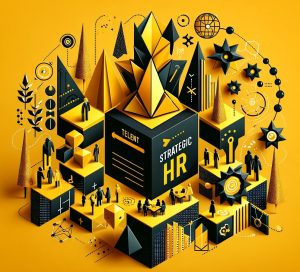In the intricate symphony of a modern business, Human Resources (HR) stands as the conductor, harmonizing the talents, passions, and aspirations of its people to drive organizational success. Far from being a mere administrative function, HR encompasses a comprehensive and dynamic field that plays a pivotal role in shaping an organization’s trajectory. Encompassing a multitude of critical functions HR should ensure that organization’s workforce is well-equipped, engaged, and aligned with its strategic objectives. HR also ensures that the organization has the right people with the right skills in the right positions, doing the right jobs. In today’s competitive landscape, HR has evolved from a back-office function to a strategic partner, playing an integral role in shaping an organization’s future.
The Scope of Human Resources Management (HRM)
Human Resources Management (HRM) is the strategic approach to the effective and efficient management of people in a company. The primary aim of HRM is to maximize employee performance in service of their employer’s strategic objectives. HRM focuses on policies and systems, overseeing employee relations, compensation and benefits management, talent acquisition, performance management, and compliance with employment laws.
In essence, HRM is not merely about managing the day-to-day operations of a workforce; it is about strategically cultivating a high-performing, engaged, and compliant workforce that empowers an organization to thrive in an ever-changing world. By aligning HRM practices with the organization’s overall strategic objectives, businesses can unlock the full potential of their people, driving innovation, growth, and sustainable success.
The Role of HR in recruitment and talent acquisition
Recruitment is one of the most recognizable roles of HR. This involves not just filling vacancies but strategically aligning talent acquisition with the company’s long-term goals. HR professionals are tasked with attracting, selecting, and appointing suitable candidates for jobs within an organization:
- Beyond filling vacancies – a holistic approach to talent acquisition: effective talent acquisition extends beyond simply filling vacant positions. It’s about proactively identifying and securing the right talent to fuel the organization’s growth and success. HR professionals must possess a deep understanding of the organization’s strategic direction and future aspirations to align talent acquisition efforts with the organization’s overall vision.
- Attracting the best and brightest – a winning strategy: in the quest for top talent, HR must employ a multifaceted approach that goes beyond traditional recruitment methods. Creating a compelling employer brand, showcasing the organization’s culture and values, and leveraging social media to reach a wider pool of candidates are essential strategies.
- Selecting for success – the art of candidate evaluation: with an array of qualified candidates, HR must employ rigorous selection processes to identify the ideal fit for the organization. This involves evaluating candidates’ skills, experience, cultural fit, and potential to contribute to the organization’s long-term success.
- Onboarding – setting the stage for success: a smooth and engaging onboarding process is crucial for integrating new hires into the organization and ensuring their success. HR plays a key role in designing and implementing onboarding programs that foster a sense of belonging, provide valuable training, and integrate new employees into the company culture.
Effective talent acquisition is not a one-time event; it’s an ongoing process that requires continuous evaluation and refinement. HR must stay abreast of industry trends, monitor workforce demographics, and adapt talent acquisition strategies to ensure that the organization remains competitive in the talent marketplace.
Training and development: investing in human capital
HR plays a crucial role in the ongoing training and development of employees. This is vital in equipping the workforce with the necessary skills and knowledge to meet evolving business challenges. In the dynamic and ever-evolving landscape of the business world, organizations cannot afford to stand still. HR designs and implements various training programs and professional development initiatives to foster employee growth and productivity:
- Designing personalized development paths – tailoring training to individual needs: effective training and development programs are not one-size-fits-all solutions. HR professionals must recognize that each employee’s needs and aspirations are unique. This requires tailoring training programs to individual skill gaps, career goals, and learning styles.
- Leveraging a multifaceted approach – diversifying training methods: to capture the attention of a diverse workforce and maximize the effectiveness of training, HR should adopt a multifaceted approach that encompasses a variety of methods. This includes traditional classroom instruction, e-learning modules, on-the-job training, and mentorship programs.
- Continuous evaluation and improvement – ensuring a return on investment: training and development programs should not be a standalone initiative; they must be integrated into the organization’s overall strategic plan. HR should continuously evaluate the effectiveness of training programs, gather feedback from participants, and refine strategies to ensure that training efforts are delivering a tangible return on investment.
Training and development are not mere luxuries; they are essential investments that fuel organizational growth and success. By providing employees with opportunities to acquire new skills, knowledge, and perspectives, HR empowers them to tackle complex challenges, adapt to changing demands, and contribute more effectively to the organization’s goals.
Enhancing employee engagement and satisfaction
Employee engagement and job satisfaction are key areas of focus in HRM. HR strategies aimed at increasing engagement include recognizing and rewarding employee achievements, creating a positive and inclusive work environment, and ensuring clear communication between management and staff. A highly engaged workforce is more productive, innovative, and committed to the organization’s goals, driving growth and profitability:
- The enduring power of recognition and rewards: recognition and rewards play a pivotal role in fostering employee engagement. When employees feel their contributions are valued and appreciated, their motivation and morale soar. HR should implement a culture of recognition that goes beyond monetary rewards, encompassing verbal praise, public acknowledgment, and special recognition programs.
- Creating a positive and inclusive work environment: a positive and inclusive work environment is a cornerstone of employee engagement. HR plays a vital role in cultivating a culture where employees feel respected, valued, and empowered to contribute. This involves fostering open communication, promoting diversity and inclusion, and addressing workplace issues in a timely and effective manner.
- Ensuring clear communication – the foundation of engagement: effective communication is the lifeblood of an engaged workforce. HR should promote open and transparent communication channels, ensuring that employees have a voice and feel heard. This includes regular feedback sessions, meetings, and open communication policies that encourage employees to share their ideas and concerns.
- Beyond recognition and rewards – fostering a culture of belonging: engagement goes beyond tangible rewards; it’s about creating a sense of belonging and purpose within the organization. HR should cultivate a culture that values employee well-being, promotes work-life balance, and encourages social interaction among team members.
Nurturing employee engagement is not a mere cost; it’s a strategic investment that yields significant returns. Engaged employees are more productive, creative, and committed to the organization’s success. By creating a workplace where employees feel valued, appreciated, and empowered, HR can unlock the full potential of the workforce, driving innovation, growth, and sustained success for the organization.
Ensuring compliance and managing employee relations
HR is responsible for ensuring that the organization complies with all relevant labour laws and employment standards. This includes managing employee relations and addressing issues such as grievances, disciplinary actions, and workplace disputes:
- Protecting employee rights – the cornerstone of compliance: HR is responsible for ensuring that the organization adheres to all applicable labour laws, protecting the rights of employees and fostering a fair and equitable workplace environment. This includes ensuring equal employment opportunities, preventing discrimination and harassment, and providing fair wages and working conditions.
- Managing employee relations – navigating workplace issues: HR acts as a mediator and facilitator in resolving workplace disputes and grievances. This involves investigating complaints promptly, conducting impartial investigations, and providing support to both employees and managers. HR should also develop policies and procedures to prevent grievances from arising in the first place.
- Disciplinary action – addressing misconduct effectively: when employees violate company policies or commit misconduct, HR plays a crucial role in administering fair and consistent disciplinary action. This involves documenting incidents, conducting investigations, and ensuring that disciplinary measures are proportionate to the offense.
- Conflict resolution – fostering harmony in the workplace: HR should establish clear guidelines and procedures for conflict resolution, providing employees with avenues to address concerns and resolve disputes peacefully. This may involve mediation, negotiation, and conflict management training programs.
Ensuring compliance with employment laws and effectively managing employee relations are not just administrative tasks; they are essential elements of a successful HR strategy. By upholding compliance and fostering positive workplace relationships, HR can create a culture of trust, respect, and fairness, leading to a more productive, engaged, and satisfied workforce.
The impact of effective HR practices
The effectiveness of an organization’s HR department has a profound impact on its overall performance. By fostering a positive work environment, investing in employee development, and aligning HR strategies with business goals, HR can:
- Enhance employee engagement and productivity: engaged employees are more motivated, productive, and committed to their work, leading to improved organizational outcomes.
- Attract and retain top talent: a well-managed HR function attracts and retains top talent, ensuring the organization has the skills and expertise it needs to succeed.
- Reduce costs and promote efficiency: by minimizing turnover, preventing disputes, and optimizing resource allocation, HR can save costs and improve operational efficiency.
- Drive innovation and creativity: a motivated and engaged workforce is more likely to come up with new ideas and solutions, fostering innovation and growth.
- Build a strong organizational culture: HR plays a key role in shaping the organization’s culture, fostering values such as collaboration, respect, and integrity.
In recent years, HR has evolved from a passive administrative role to a proactive strategic partner. HR professionals are increasingly involved in shaping the organization’s strategic direction, providing insights on workforce planning, organizational culture, and talent management. This strategic involvement allows HR to align its efforts with the organization’s overall business objectives, ensuring that human capital is effectively utilized to drive growth and innovation.
The strategic role of HR in organizational success
In modern businesses, HR is seen as a strategic partner rather than just an administrative function. HR professionals are increasingly involved in planning and decision-making processes, helping to shape the strategic direction of the organization with insights on workforce management and organizational culture.
Human Resources is a dynamic and essential field that extends beyond managing employment processes. It is about nurturing a company’s human capital and aligning HR strategies with business objectives. The effectiveness of an organization’s HR department can significantly influence its overall health, culture, and performance, making HR a critical component in any successful business.
As the world of work continues to evolve, HR is poised to play an even more prominent role in shaping the future of organizations. Embracing emerging technologies, such as artificial intelligence and data analytics, HR professionals will be able to gain deeper insights into employee behaviour, preferences, and performance. This data-driven approach will enable HR to develop personalized and effective strategies that optimize workforce performance and align with the organization’s strategic vision.





